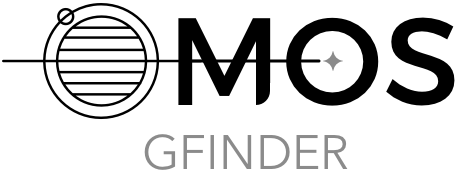Geometrical Models
Contents
Geometrical Models#
MOS computation is done based on geometrical models largely relying on the SPICE toolkit and kernels, ancillary data in the form of text or binary files. The JUICE SPICE kernel dataset (SKD) contains all the required kernels for modelling and computing the geometry of the JUICE spacecraft, instruments and targets.

Time systems#
(LSK, SCLK)
UTC
Ephemeris Time (ET)
Solar System bodies ephemeris and shape#
(PCK, SPK, DSK)
Primary targets:
JUPITER
GANYMEDE
CALLISTO
EUROPA
IO
Secondary targets:
MARS
VENUS
EARTH
JUICE S/C trajectory and pointing#
(SPK, CK)
Predicted (for planning)
Reconstructed (for data analysis)
MAJIS detectors FOV and pointing#
(FK, IK, CK)
Boresight and FOV (FK, IK)
MAJIS scanner pointing (CK)
Reference frames#
(FK)
SPICE Frames for the JUICE spacecraft, its structures, and science instruments, as well as for the Ground Earth Stations are defined in Frame Kernel (FK) files. It includes frame definitions for science operations and for data analysis and scientific investigations.
MAJIS frames:
JUICE_MAJIS_BASE JUICE_SPACECRAFT FIXED -28400
JUICE_MAJIS_SCAN JUICE_MAJIS_BASE CK -28401
JUICE_MAJIS_VISNIR JUICE_MAJIS_SCAN FIXED -28410
JUICE_MAJIS_IR JUICE_MAJIS_SCAN FIXED -28420
MAJIS frame hierarchy:
"JUICE_SPACECRAFT"
------------------
|
|<-fixed
|
v
"JUICE_MAJIS_BASE"
------------------
|
|
|<-ck
|
v
"JUICE_MAJIS_SCAN"
+-----------------------------------+
| |
|<-fixed |<-fixed
| |
v v
"JUICE_MAJIS_VISNIR" "JUICE_MAJIS_IR"
-------------------- ----------------
Dynamic frames#
Dynamic frames are time-dependent reference frames defined via a frame kernel. A “parameterized dynamic frame” is a dynamic frame defined by a formula implemented in CSPICE code and having user-selectable parameters set via a frame kernel. The formula defining a dynamic frame may rely on data from other SPICE kernels, for example state vectors provided by SPK files or rotation matrices from C-kernels or PCK files.
These frames can be used stand-alone, i.e. (1) referring directly to them and assuming they correspond to the JUICE spacecraft reference frame, or (2) in combination with the JUICE spacecraft frames. The latter will allow the user to use the existing alignments and instrument frame definitions to perform instrument specific mission analysis and attitude dependent science opportunity identification.
The following frames are defined in the OPS FK kernel file:
SPICE Frame Name Long-name
------------------------ ---------------------------------------------
JUICE_EARTH_COMMS JUICE HGA Earth communications pointing
JUICE_SA+Y_DEFAULT JUICE +Y Solar Array Default Orientation
JUICE_SA-Y_DEFAULT JUICE -Y Solar Array Default Orientation
JUICE Nadir orbit-aligned (NOA) pointing:
JUICE_CALLISTO_NOA JUICE Nadir orbit-aligned pointing @ Callisto
JUICE_EUROPA_NOA JUICE Nadir orbit-aligned pointing @ Europa
JUICE_JUPITER_NOA JUICE Nadir orbit-aligned pointing @ Jupiter
JUICE_GANYMEDE_NOA JUICE Nadir orbit-aligned pointing @ Ganymede
JUICE_MARS_NOA JUICE Nadir orbit-aligned pointing @ Mars
JUICE_VENUS_NOA JUICE Nadir orbit-aligned pointing @ Venus
JUICE_EARTH_NOA JUICE Nadir orbit-aligned pointing @ Earth
JUICE Nadir power-optimized (NPO) pointing:
JUICE_CALLISTO_NPO JUICE Nadir power-optimized pointing @ Callisto
JUICE_EUROPA_NPO JUICE Nadir power-optimized pointing @ Europa
JUICE_JUPITER_NPO JUICE Nadir power-optimized pointing @ Jupiter
JUICE_GANYMEDE_NPO JUICE Nadir power-optimized pointing @ Ganymede
JUICE_IO_NPO JUICE Nadir power-optimized pointing @ Io
JUICE Ramming direction (RAM) pointing:
JUICE_CALLISTO_RAM JUICE Ramming direction pointing @ Callisto
JUICE_EUROPA_RAM JUICE Ramming direction pointing @ Europa
JUICE_JUPITER_RAM JUICE Ramming direction pointing @ Jupiter
JUICE_GANYMEDE_RAM JUICE Ramming direction pointing @ Ganymede
Data visualisation coordinate systems#
Time-series View#
Pointing View#
Map View#

Geometric search types and constraints#
The SPICE Geometry Finder (GF) subsystem deals with two types of geometric quantities:
“Binary state functions”: functions of time that can be “true” or “false.”
Scalar numeric functions of time
Numeric searches find times when a scalar numeric quantity satisfies a mathematical constraint. The supported constraints are, the function:
equals a specified reference value.
is less than a specified reference value.
is greater than a specified reference value.
is at a local maximum.
is at a local minimum.
is at an absolute maximum.
is at an absolute minimum.
is at an “adjusted” absolute maximum: the function is within a given tolerance of the absolute maximum.
is at an “adjusted” absolute minimum: the function is within a given tolerance of the absolute minimum.
